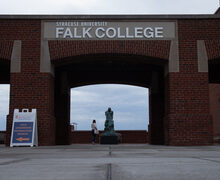Leaving a legacy: Maxwell dean looks back on accomplishments as departure approaches
Mitchel Wallerstein, dean of the Maxwell School of Citizenship and Public Affairs, is leaving Syracuse University in July to become president of Baruch College. He served as dean of Maxwell for seven years.
When Mitchel Wallerstein returned to Syracuse University in 2003 after 31 years away, he was surprised by the changes that greeted him. No student protested across the Quad, the football team no longer played in Archbold Stadium and his alma mater, the Maxwell School of Citizenship and Public Affairs, had a new building — one in which he would soon reside.
“It was a very, very different time,” he said of his years as a graduate student in Maxwell. “It was a time of great student activism. Literally, every day there were student protests in front of Hendricks Chapel and marches on the Quad. The students were very, very engaged.”
Wallerstein has been Maxwell’s dean for the past seven years. He will leave the No. 1 graduate school for public affairs in July to become president of Baruch College, a City University of New York school.
During his time as dean at Maxwell, Wallerstein developed new partnerships with other colleges within SU, oversaw the creation of new programs and majors, and adapted the school to thrive in what he sees as a more international world.
Wallerstein’s visit to SU for his primary interview for the Maxwell deanship, in 2003, marked his first time on campus since 1972, when he graduated with a master’s degree in public administration. Wallerstein was one of about a dozen initial candidates for the position, said David Rubin, chair of the search committee and then-dean of the S.I. Newhouse School of Public Communications.
“We liked the fact that he was an SU grad,” Rubin said. “We do think that knowing the institution helps a lot, and having Orange in your blood is good.”
Wallerstein met his wife while attending SU in the ‘70s. While both have fond memories of the SU they had attended, the changes he saw upon his return were welcome ones. He said the university suffered worse financial conditions than it does today and many of the buildings around campus were old and in disrepair then. The Maxwell building, which is home to his office, had not even been built yet.
“I felt the place looked a lot better,” he said of his visit.
After graduating from SU, Wallerstein went on to receive a master’s and a doctorate degree in political science from the Massachusetts Institute of Technology, where he began his career in academia in 1978. He then went on to teach at Holy Cross College, George Washington University, Georgetown, Johns Hopkins University and eventually SU.
Wallerstein moved to Washington, D.C., in 1985, where he worked for the National Research Council of the National Academies of Sciences and Engineering, the U.S. Department of Defense and the MacArthur Foundation.
He attributes his almost 20-year period in Washington to what he said people call the ‘Potomac fever.’
“It means that people go there thinking, ‘Oh, I’m just going to stay here for a year or two,”’ he said. “I stayed for 18.”
While in Washington, Wallerstein spent five years working in the Clinton administration as deputy assistant secretary for counterproliferation policy and senior representative for trade security policy. He worked on issues regarding nuclear, biological and chemical weapons, while also protecting national security by keeping such technologies secret.
Of his experiences in the Clinton administration, Wallerstein said one of his proudest accomplishments was establishing and co-chairing a NATO committee on nuclear proliferation after the first Gulf War. During that time, he spent about one weekend a month in Brussels working with committee members.
In addition to working with the president, Wallerstein also worked as the vice president for international programs at the MacArthur Foundation. The MacArthur Foundation works to defend human rights, advance global conservation and security, make cities better places and understand how technology is affecting children and society, according to its Web site.
It was in this position that Wallerstein had the opportunity to travel across the world, including to the headwaters of the Amazon, the Ngoro Ngoro crater in Tanzania and the Riff Valley in Kenya. He was part of a project at that focused on biodiversity conservation, which worked to eliminate the extinction of species and to preserve forests.
“Some of the places you’re about as far away from civilization as you can be on the planet,” he said of the places he traveled to during that time.
But Wallerstein always knew he wanted to return to academia. As an SU alumnus, Maxwell seemed like the perfect place for that return.
Maxwell is the No. 1 graduate school for public affairs, according to U.S. News and World Report, and one of the top 10 international affairs programs. In addition, the school houses all of the undergraduate social science departments, and the students in those programs are jointly managed between Maxwell and the College of Arts and Sciences. It’s also home to a number of academic institutes, including the Campbell Public Affairs Institute, the Moynihan Institute of Global Affairs, and the Institute for National Security and Counterterrorism.
When Wallerstein came to the university in 2003, the Institute for National Security and Counterterrorism was managed under the College of Law and was just getting off the ground. His work in the Clinton administration with counterterrorism specifically made him question why Maxwell didn’t have a bigger role in the institute.
“It struck me as odd when I came that here’s this No. 1 school for public affairs in the country, and it has no focus on national security, particularly counterterrorism,” he said.
William Banks, director of the Institute for National Security and Counterterrorism, said Wallerstein approached him when he first came to the university about jointly managing the institute through Maxwell and the College of Law. The two met during the summer of 2003 after Wallerstein was hired, Banks said, and they immediately hit it off after discovering they shared common interests in the area of national security.
“It just became natural that we would try and work together, and it seemed to us and to (the dean of the law school) that it made sense for the institute to expand,” Banks said.
Since the schools began jointly running the institute, Wallerstein has proven to be a collaborative and involved dean, Banks said.
“Mitch is open, he’s collaborative, he’s very smart, he does his homework, he comes to meetings and events prepared, and he has his own ideas, but he’s quite willing to let others have their say and shape the way discussions go,” Banks said.
In addition to partnering with the College of Law, Wallerstein, together with Rubin, the dean of Newhouse, began two new degree programs between Newhouse and Maxwell. One combines masters in public relations and international affairs for a degree in public diplomacy. The only other school that offers this type of degree is the University of Southern California. Students can also combine the television, radio and film and history majors for a degree in history and documentary filmmaking.
From the committee that brought Wallerstein to the university to developing new programs to serving on the committee that helped implement a new budget system for the university, Wallerstein and Rubin became close colleagues and friends.
“I find him to be a very friendly guy with a good sense of humor and a backbone, and he can be tough and fight for his school, and I could be tough and fight for my school, so I liked that in him,” Rubin said.
In addition to the new programs on the graduate level, the undergraduate Middle Eastern studies major was also created in 2008. The program began in 2003, but the major was not available until 2008, said Mehrzad Boroujerdi, director of the program.
Boroujerdi also said Wallerstein worked hard to bring an international perspective to Maxwell. He has traveled across the world to strengthen Maxwell’s relationships with other universities, including making an agreement with the American University of Beirut so that students can study in Lebanon. Wallerstein said he thinks his international experiences made him adesirable candidate for dean because today’s world is more globalized than ever.
Wallerstein said he, Rubin and current Newhouse Dean Lorraine Branham have had a joke since Newhouse III was built: it’s Maxwell’s turn for a third building.
He didn’t get that building. But he did accomplish many other things during his deanship — 11 endowed professorships and chairs were created, Maxwell’s individual endowment doubled and the Moynihan Institute received a $10 million grant from Congress.
He also kept Maxwell the No. 1 school in its field — an achievement initially made by his predecessor, John Palmer — for all seven years of his deanship.
“When you’re No. 1, there is no place to go but down, and that didn’t happen. He kept it there,” Rubin said. “While I don’t put great store in these kinds of rankings, nevertheless, I think it’s a very good sign that Mitch took a strong Maxwell and kept it strong.”
After spending seven years in Syracuse, Wallerstein will return to a city lifestyle at Baruch. The school is about the same size as SU, with 16,000 students, but there is no quad, no dormitories and no green space.
In addition to the academic opportunities he will receive at Baruch, he’s happy to be moving closer to his family.
But even as he moves on, he will value the time he’s spent at SU and the accomplishments he’s made. Syracuse may not be as exciting as the headwaters of the Amazon, as exotic as the Ngorongoro Crater or even as fast-paced as New York City, but it’s a place he’s called home more than once.
“I’m going to miss Central New York,” he said. “Until you leave it, you don’t really appreciate how friendly and engaging it is up here. The pace is a little bit slower. Of course it’s a much smaller city. So, you know, I have to adjust my thinking.”
Published on March 22, 2010 at 12:00 pm




